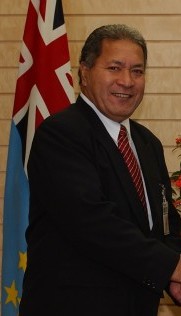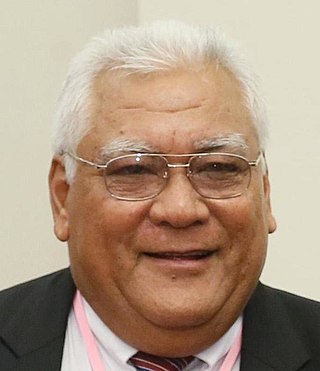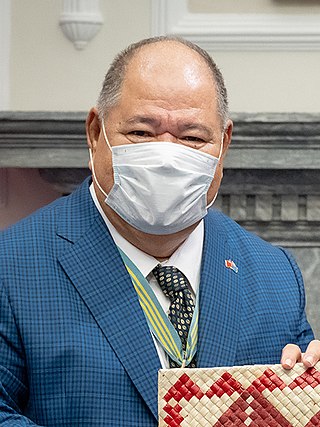Related Research Articles
The politics of Tuvalu takes place in a framework of a parliamentary representative democratic monarchy, whereby the monarch is the head of state, represented by the governor-general, while the prime minister is the head of government. Executive power is exercised by the government.

Saufatu Sopoanga was a Tuvaluan politician who served as the eighth prime minister of Tuvalu from 2 August 2002 to 27 August 2004. He drew international attention for his speeches warning about the effects of the rising sea level on Tuvalu and other low-lying island countries.

Faimalaga Luka OBE was a political figure from the Pacific nation of Tuvalu. He represented the constituency of Nukufetau in the Parliament of Tuvalu. He served as Governor-General and the Prime Minister of Tuvalu.
Sir Tomasi Puapua is a political figure who represented Vaitupu in the Parliament of Tuvalu. He attended the Fiji School of Medicine and the Otago University Medical School. He married Riana Puapua.

Maatia Toafa OBE is a Tuvaluan politician, representing Nanumea, who served two non-consecutive terms as Prime Minister of Tuvalu. He first served as prime minister, and foreign minister, from 2004 to 2006, from the resignation of his predecessor, Saufatu Sopoanga, until the defeat of his Cabinet in the 2006 general election. From 2004 to 2006 he also held the role of foreign minister.

Nukufetau is an atoll that is part of the nation of Tuvalu. The atoll was claimed by the US under the Guano Islands Act some time in the 19th century and was ceded in a treaty of friendship concluded in 1979 and coming into force in 1983. It has a population of 597 who live on Savave islet.
Tuvalu elects a legislature on a national level. The Parliament of Tuvalu has 16 members, elected for a four-year term in 8 double-seat constituencies. Tuvalu is a de facto non-partisan democracy since it does not have political parties. The political system is based on personal alliances and loyalties derived from clan and family connections. It does tend to have both a distinct government and a distinct opposition. The 16 members of the current parliament are elected from eight two-seat constituencies via plurality block voting.

Bikenibeu Paeniu, PC is a politician from Tuvalu. He represented the constituency of Nukulaelae in the Parliament of Tuvalu. He has served twice as the Prime Minister of Tuvalu, and now serving as Tuvaluan ambassador to Taiwan since June 2022.

Sir Kamuta Latasi is a political figure from the Pacific nation of Tuvalu from Funafuti atoll. He was elected to the Parliament of Tuvalu in 1992. Latasi served as the 4th prime minister, and foreign minister, from 1993 until 1996. He has served as the Speaker of parliament from 2006 to September 2010 and again from December 2010 to March 2014.
General elections were held in Tuvalu on 25 July 2002. All candidates were independents, as there are no political parties in the country. Saufatu Sopoanga was appointed prime minister after the election as the previous prime minister Koloa Talake lost his seat.
Koloa Fineaso Talake was a political figure from the Pacific nation of Tuvalu. He represented the constituency of Vaitupu in the Parliament of Tuvalu from 1993. He served as Minister of Finance (1993-1996) and was the prime minister for a short period of time.
The Cabinet of Tuvalu is the executive branch of the government of Tuvalu.
General elections were held in Tuvalu on 26 March 1998.
A by-election was held in the Nanumea constituency in Tuvalu on 5 May 2003. It was triggered by the annulment in February of incumbent MP Sio Patiale's election in the July 2002 general election. Patiale was found by the country's High Court of Tuvalu to have "lodged his nomination papers after the legal deadline", and thus not to have stood lawfully as a candidate in the general election.
A by-election was held in the Niutao constituency in Tuvalu on 5 May 2003. It was triggered by the death of the incumbent MP, Saloa Tauia. Tauia, the Speaker of Parliament, died in February, after having entered Parliament in the July 2002 general election.
Elisala Pita OBE was a Tuvaluan politician.

The governor-general of Tuvalu is the representative of the Tuvaluan monarch, currently King Charles III, in the country of Tuvalu.
Amasone Kilei was a Tuvaluan politician who represented Nui. He was appointed the Minister of Health and the Minister of Education, Sports and Culture, in the government of Lagitupu Tuilimu, who was acting prime minister from 8 December 2000 to 24 February 2001.
References
- ↑ Hassall, Graham (2006). "The Tuvalu General Election 2006". Democracy and Elections project, Governance Program, University of the South Pacific. Retrieved 11 April 2015.
- ↑ "Amasone v Attorney General [2003] TVHC 4; Case No 24 of 2003 (6 August 2003)". PACLII. Retrieved 5 April 2015.
- ↑ "Tuvalu PM Arranges for Recall of Parliament" [usurped] , Radio Australia, 26 August 2003
- ↑ Lansford, Tom (2015). Political Handbook of the World 2015. CQ Press.
- ↑ Craig, Robert D. (2010). Historical Dictionary of Polynesia. Scarecrow Press.
- ↑ "New Member of Parliament in Tuvalu" [usurped] , Radio Australia, 13 October 2003
- ↑ Paulson Panapa & Jon Fraenkel (2008). "The Loneliness of the Pro-Government Backbencher and the Precariousness of Simple Majority Rule in Tuvalu" (PDF). Research School of Pacific and Asian Studies, Australian National University. Archived from the original (PDF) on 4 March 2016. Retrieved 11 April 2015.